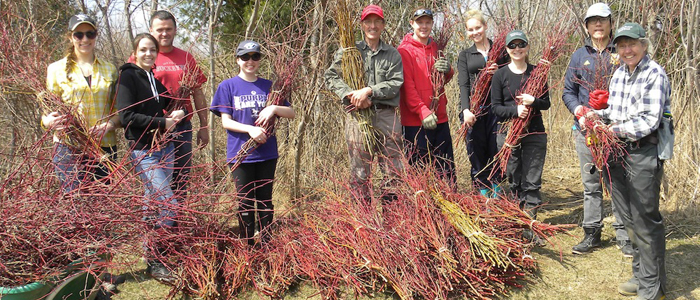Western University and Thames Talbot Land Trust partner for restoration and learning

Photo taken by: Anita Caveney
Preparing fascines (117 of them!) for erosion control and fixing ATV ruts on a steep slope at Wardsville Woods. April 7th, 2013.
In the fall 2012 term, the Biology 3222F (Special Topics in Restoration Ecology) class partnered with Thames Talbot Land Trust (TTLT) to provide students with a unique learning experience allowing them to apply theory they learn in the classroom to a real world scenario. The class is run as a Community Service Learning course which includes community service with a local partner. Last year’s partner was TTLT, a non-profit organization dedicated to the protection of lands and waters with significant natural, recreational, scenic, historical or agricultural value. Groups of students worked on projects related to management and restoration of the stream, former golf fairways, eroded forest slopes, swamps, ponds and tackling invasive species at the Wardsville Woods property. The many challenges of restoring Wardsville Woods are opportunities for students at Western University to learn the science and practice of restoration. The class included a field trip to Wardsville Woods on October 20th where students were able to study the site and collect data to help them write their plans. Several TTLT volunteers and board members attended the day to mentor students and show them around the site.
Each group prepared a presentation and a report on their chosen topic. Students looked up historical maps of the area, researched habitat types and restoration methods, set goals for restoration and developed ways to measure success of projects. All groups contributed to the writing of a management table for the Wardville Woods property that was submitted to TTLT. TTLT benefited from the fresh perspective and energy of enthusiastic students who are able to bring current research to TTLT’s planning and decision making. In addition, this partnership engaged a younger generation in their community and showed them the many benefits of volunteering their skills.
After the course ended 11 students applied for and received the RBC Foundation Collaborative Community Project Grant valued at $2000. From January to August the group worked on website and educational materials, trail and signage design for the property, and bioengineering to restore eroded slopes. The students are putting their management plans into action! The students also participated in species at risk inventories and assessments. The partnership has been fruitful for both Western students and TTLT.
The course runs every fall and has a different partner and different projects each year. This year the course is partnered with Carolinian Canada Coalition and the Municipality of Chatham-Kent. The course is supported by the Community Service Learning Team at The Student Success Centre.
Daria Koscinski
Posted September 26, 2013

